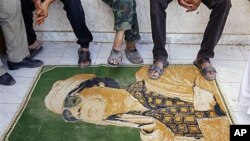Where is Moammar Gadhafi? His second wife and two sons surfaced Monday in neighboring Algeria. But people in Libya’s capital say their leader of 42 years is yesterday’s man.
For 42 years, Green Square was the stage set for Moammar Gadhafi’s speeches against enemies all around Libya.
Today, it is called Martyrs’ Square, in honor of fighters who died to break his grip on Libya.
Instead of banners hailing the “King of Kings,” graffiti now reads “Finito,” and “Game Over.”
A big new sign implores rebels to stop celebrating by shooting their guns into the air.
Khalil Salem Melad Almosrat, a 56-year-old pensioner, pauses from cleaning up the litter of bullet casings. An army veteran of Gadhafi’s wars in Chad, he said that after all the warlike speeches, the Libyan leader proved to be a coward.
Almosrat said that Gadhafi told the world “he was a mujahedeen, a Bedouin, that he would fight until the last bullet. When the fight came to him, he just ran away.”
He believes that Gadhafi may have escaped into the Sahara, possibly southern Algeria. On Monday evening, Algeria’s foreign ministry reported that Gadhafi’s second wife and two of his sons had entered Algeria.
Almosrat, the war veteran, is surprised when asked if Gadhafi's family will ever return to rule Libya. In Arabic, he responds: "Impossible, impossible, impossible."
Nearby, Khaled Abid, a 35-year-old government manager, stands in the shade of an arcade facing the sun-baked square.
For him, Gadhafi is yesterday’s man. Asked what are the chances that Gadhafi's clan will return to rule Libya, he replied, “Not even ‘minus one percent.”
Ten steps away, the National Commercial Bank is re-opening for business with a new doormat - the bank’s former lobby portrait of Gadhafi.
One customer spits on the portrait. Another pauses to ostentatiously wipe his feet on the image of the fallen leader. A third, an elderly man, dances a little jig, then takes off a shoe, then repeatedly hammers Gadhafi in the face with his loafer.
Inside the building, Hussein Kharaka, a bank executive, catches up with colleagues in their first day back at work since revolution turned Tripoli upside down 10 days ago.
He is optimistic about Libya’s future, believing that banks now will be run along international lines, and that Libya will have good relations with Europe and the United States.
Asked about the man who once called himself, “The King of African Kings,” work colleagues listen as Kharaka responds in Arabic, “He is in one of his holes, he is a coward; he can’t even face people.”
On the way back to the hotel, the driver plays a CD with Libya’s new provisional anthem. There are taxis on the streets. Banks are open. Shops are open. Some of the Gadhafis in Algeria. Across Tripoli, it is clear the Gadhafi mystique is broken.
On Tripoli Streets: the Gadhafi Mystique is Broken
- By James Brooke




